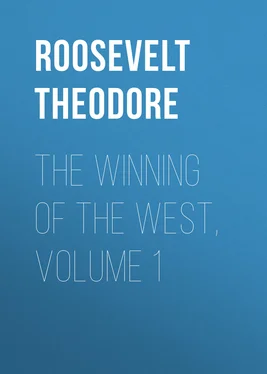Theodore Roosevelt - The Winning of the West, Volume 1
Здесь есть возможность читать онлайн «Theodore Roosevelt - The Winning of the West, Volume 1» — ознакомительный отрывок электронной книги совершенно бесплатно, а после прочтения отрывка купить полную версию. В некоторых случаях можно слушать аудио, скачать через торрент в формате fb2 и присутствует краткое содержание. Жанр: foreign_prose, История, foreign_edu, foreign_antique, на английском языке. Описание произведения, (предисловие) а так же отзывы посетителей доступны на портале библиотеки ЛибКат.
- Название:The Winning of the West, Volume 1
- Автор:
- Жанр:
- Год:неизвестен
- ISBN:нет данных
- Рейтинг книги:5 / 5. Голосов: 1
-
Избранное:Добавить в избранное
- Отзывы:
-
Ваша оценка:
- 100
- 1
- 2
- 3
- 4
- 5
The Winning of the West, Volume 1: краткое содержание, описание и аннотация
Предлагаем к чтению аннотацию, описание, краткое содержание или предисловие (зависит от того, что написал сам автор книги «The Winning of the West, Volume 1»). Если вы не нашли необходимую информацию о книге — напишите в комментариях, мы постараемся отыскать её.
The Winning of the West, Volume 1 — читать онлайн ознакомительный отрывок
Ниже представлен текст книги, разбитый по страницам. Система сохранения места последней прочитанной страницы, позволяет с удобством читать онлайн бесплатно книгу «The Winning of the West, Volume 1», без необходимости каждый раз заново искать на чём Вы остановились. Поставьте закладку, и сможете в любой момент перейти на страницу, на которой закончили чтение.
Интервал:
Закладка:
All the European nations touching on the Atlantic seaboard took part in the new work, with very varying success; Germany alone, then rent by many feuds, having no share therein. Portugal founded a single state, Brazil. The Scandinavian nations did little: their chief colony fell under the control of the Dutch. The English and the Spaniards were the two nations to whom the bulk of the new lands fell: the former getting much the greater portion. The conquests of the Spaniards took place in the sixteenth century. The West Indies and Mexico, Peru and the limitless grass plains of what is now the Argentine Confederation,—all these and the lands lying between them had been conquered and colonized by the Spaniards before there was a single English settlement in the New World, and while the fleets of the Catholic king still held for him the lordship of the ocean. Then the cumbrous Spanish vessels succumbed to the attacks of the swift war-ships of Holland and England, and the sun of the Spanish world-dominion set as quickly as it had risen. Spain at once came to a standstill; it was only here and there that she even extended her rule over a few neighboring Indian tribes, while she was utterly unable to take the offensive against the French, Dutch, and English. But it is a singular thing that these vigorous and powerful new-comers, who had so quickly put a stop to her further growth, yet wrested from her very little of what was already hers. They plundered a great many Spanish cities and captured a great many Spanish galleons, but they made no great or lasting conquests of Spanish territory. Their mutual jealousies, and the fear each felt of the others, were among the main causes of this state of things; and hence it came about that after the opening of the seventeenth century the wars they waged against one another were of far more ultimate consequence than the wars they waged against the former mistress of the western world. England in the end drove both France and Holland from the field; but it was under the banner of the American Republic, not under that of the British Monarchy, that the English-speaking people first won vast stretches of land from the descendants of the Spanish conquerors.
The three most powerful of Spain's rivals waged many a long war with one another to decide which should grasp the sceptre that had slipped from Spanish hands. The fleets of Holland fought with stubborn obstinacy to wrest from England her naval supremacy; but they failed, and in the end the greater portion of the Dutch domains fell to their foes. The French likewise began a course of conquest and colonization at the same time the English did, and after a couple of centuries of rivalry, ending in prolonged warfare, they also succumbed. The close of the most important colonial contest ever waged left the French without a foot of soil on the North American mainland; while their victorious foes had not only obtained the lead in the race for supremacy on that continent, but had also won the command of the ocean. They thenceforth found themselves free to work their will in all seagirt lands, unchecked by hostile European influence.
Most fortunately, when England began her career as a colonizing power in America, Spain had already taken possession of the populous tropical and subtropical regions, and the northern power was thus forced to form her settlements in the sparsely peopled temperate zone.
It is of vital importance to remember that the English and Spanish conquests in America differed from each other very much as did the original conquests which gave rise to the English and the Spanish nations. The English had exterminated or assimilated the Celts of Britain, and they substantially repeated the process with the Indians of America; although of course in America there was very little, instead of very much, assimilation. The Germanic strain is dominant in the blood of the average Englishman, exactly as the English strain is dominant in the blood of the average American. Twice a portion of the race has shifted its home, in each case undergoing a marked change, due both to outside influence and to internal development; but in the main retaining, especially in the last instance, the general race characteristics.
It was quite otherwise in the countries conquered by Cortes, Pizarro, and their successors. Instead of killing or driving off the natives as the English did, the Spaniards simply sat down in the midst of a much more numerous aboriginal population. The process by which Central and South America became Spanish bore very close resemblance to the process by which the lands of southeastern Europe were turned into Romance-speaking countries. The bulk of the original inhabitants remained unchanged in each case. There was little displacement of population. Roman soldiers and magistrates, Roman merchants and handicraftsmen were thrust in among the Celtic and Iberian peoples, exactly as the Spanish military and civil rulers, priests, traders, land-owners, and mine-owners settled down among the Indians of Peru and Mexico. By degrees, in each case, the many learnt the language and adopted the laws, religion, and governmental system of the few, although keeping certain of their own customs and habits of thought. Though the ordinary Spaniard of to-day speaks a Romance dialect, he is mainly of Celto-Iberian blood; and though most Mexicans and Peruvians speak Spanish, yet the great majority of them trace their descent back to the subjects of Montezuma and the Incas. Moreover, exactly as in Europe little ethnic islands of Breton and Basque stock have remained unaffected by the Romance flood, so in America there are large communities where the inhabitants keep unchanged the speech and the customs of their Indian forefathers.
The English-speaking peoples now hold more and better land than any other American nationality or set of nationalities. They have in their veins less aboriginal American blood than any of their neighbors. Yet it is noteworthy that the latter have tacitly allowed them to arrogate to themselves the title of "Americans," whereby to designate their distinctive and individual nationality.
So much for the difference between the way in which the English and the way in which other European nations have conquered and colonized. But there have been likewise very great differences in the methods and courses of the English-speaking peoples themselves, at different times and in different places.
The settlement of the United States and Canada, throughout most of their extent, bears much resemblance to the later settlement of Australia and New Zealand. The English conquest of India and even the English conquest of South Africa come in an entirely different category. The first was a mere political conquest, like the Dutch conquest of Java or the extension of the Roman Empire over parts of Asia. South Africa in some respects stands by itself, because there the English are confronted by another white race which it is as yet uncertain whether they can assimilate, and, what is infinitely more important, because they are there confronted by a very large native population with which they cannot mingle, and which neither dies out nor recedes before their advance. It is not likely, but it is at least within the bounds of possibility, that in the course of centuries the whites of South Africa will suffer a fate akin to that which befell the Greek colonists in the Tauric Chersonese, and be swallowed up in the overwhelming mass of black barbarism.
On the other hand, it may fairly be said that in America and Australia the English race has already entered into and begun the enjoyment of its great inheritance. When these continents were settled they contained the largest tracts of fertile, temperate, thinly peopled country on the face of the globe. We cannot rate too highly the importance of their acquisition. Their successful settlement was a feat which by comparison utterly dwarfs all the European wars of the last two centuries; just as the importance of the issues at stake in the wars of Rome and Carthage completely overshadowed the interests for which the various contemporary Greek kingdoms were at the same time striving.
Читать дальшеИнтервал:
Закладка:
Похожие книги на «The Winning of the West, Volume 1»
Представляем Вашему вниманию похожие книги на «The Winning of the West, Volume 1» списком для выбора. Мы отобрали схожую по названию и смыслу литературу в надежде предоставить читателям больше вариантов отыскать новые, интересные, ещё непрочитанные произведения.
Обсуждение, отзывы о книге «The Winning of the West, Volume 1» и просто собственные мнения читателей. Оставьте ваши комментарии, напишите, что Вы думаете о произведении, его смысле или главных героях. Укажите что конкретно понравилось, а что нет, и почему Вы так считаете.












